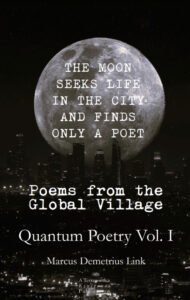
Poems from the Global Village: Quantum Poetry Vol. I is available from Keystone Publications (signed paperback) and from Amazon (paperback)
“I am a child of the lost race of the city-people”
So it began in 2004, the series of poems and one essay that has wound its way through four volumes of my Quantum Poetry series, a series which tracks a journey from finding myself trapped in the “city culture” in Volume I to finding myself at home in the cosmos in Volume IV:
“I am a child of the lost race of the city-people
that has forgotten how to live”
These are the first lines of All the Riches I Inherited, the second poem in this volume in which the city becomes a potent symbol of alienation. It reflects my modernist, fragmented worldview at the time; disconnected from nature and soul but full of yearning.
This Volume I contains four poems:
- The Death of the Human Situation
- All the Riches I Inherited
- For What I Am, It Has No Price
- My Gallows Star
The poems The Death of the Human Situation and All the Riches I Inherited lament a world where humanity is mechanized; a poetic expression of ecological alienation. The city-people I find myself born unto are symbolic of a humanity estranged from its natural and spiritual roots, reduced to fragmented existence. The city represents a severed ecosystem—one where nature and meaning have been replaced by mechanization, consumption, and loneliness.
Stylistically, the poems bear an aesthetic of starkness and grief. Their beauty lies in the raw articulation of disconnection, which, paradoxically, awakens the yearning for a return to wholeness. Inside there is an ethical call: the recognition of loss becomes the seed of ecological and existential regeneration.
“What semi-romantic piffle”
Initially, I only kept one of the poems in this volume – My Gallows Star – because it would not allow me to archive it with the others after it had received a devastating response by a critique at the time: “What semi-romantic piffle,” he had written in response to my eager request for an appraisal. The words hurt. I did not agree. Yet, they had a profound effect on me: I threw them in an archive box along with so much else.
It was a tragic and fateful decision which yet carried inside of it the possibility for me to return to the same place once again with greater consciousness once I was older and at least a more differentiated human being, if not a wiser one. That time is now because it has become clear even to me that the message written to myself and contained within those poems reflects accurately what I have alluded to elsewhere:
“Sometimes, writing is like a stepladder into the inwardness of myself. Other times, it feels as though I am being written into being by a poem maybe even over a few decades.”
“First Peoples and Second Peoples seem to have a fundamental disagreement on the nature of reality and the basic law of existence.”
It was my reading of Tyson Yunkaporta’s Sand Talk: How Indigenous Thinking Can Save the World that led me to discover the deeper meaning of these poems in my personal development. I found myself reconnecting with something that was essential to me, something of which I was made, and something which I had yet ignored and even rejected.
This is why I have quoted from Tyson’s Sand Talk in the epigraph to Poems from the Global Village:
“First Peoples and Second Peoples seem to have a fundamental disagreement on the nature of reality and the basic law of existence.”
This encapsulates what I have been trying to understand ever since and why I wrote the poems in the first place.
Available from:
